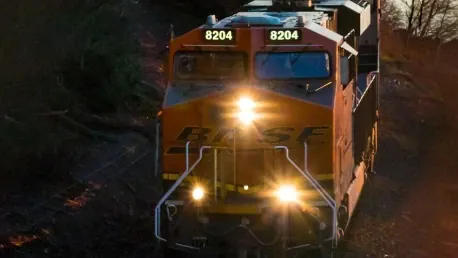The recent mandate from the Canada Industrial Relations Board (CIRB), following orders from the Canadian Minister of Labour, signals a significant turning point for Canadian Pacific Kansas City (CPKC) and CN Rail. For several months, these two major rail operators have been embroiled in labor disputes that have led to halted services, causing substantial setbacks in supply chain logistics across Canada and North America. The core topic is the reinstatement of operations and the implications for the Canadian and North American supply chains after a significant stretch of uncertainty and disruption caused by ongoing labor disputes. Now, as operations resume under the CIRB’s order, both companies are faced with the challenge of returning to normalcy while navigating the complexities of labor relations that have been strained to the breaking point.
The CIRB’s directive extends the current collective agreement until a new one is negotiated, effectively compelling CPKC and CN Rail to return to full operations. This decision comes at a crucial time when supply chains have been severely affected, and the need for reliable transportation infrastructure is paramount. CN Rail expressed disappointment over the failure to reach a new agreement but applauded the decision’s ability to end the unpredictability that has plagued supply chains for months. Meanwhile, CPKC worked anxiously on a restart plan, focusing on counteracting further disruptions and ensuring a swift and orderly return to full operations. This sentiment was echoed by Scott Shannon from C.H. Robinson, who acknowledged that achieving operational normalcy for the railroads will not be instantaneous. Instead, he predicted a week-long readjustment period, with backlog clearing taking significantly longer, indicating the depth of the challenge ahead.
Impact on Supply Chains
The restoration of normal operations by CPKC and CN Rail is expected to have wide-reaching effects on supply chains across both Canada and North America. The extended labor disputes had resulted in considerable disruptions, causing delays and uncertainties for various industries reliant on rail transportation. The CIRB’s intervention underscores the importance of rail services to the broader economy and aims to mitigate further economic disturbances. Despite the mandated return to work, stakeholders in the supply chain ecosystem have mixed feelings about the timeline for normalization. While the resumption of services brings a glimmer of hope, the process of clearing backlogs and re-establishing regular schedules is expected to be a protracted endeavor.
Scott Shannon from C.H. Robinson pointed out that even with the immediate restart of operations, the ripple effects of the disruptions will be felt for weeks, if not months. Shippers and logistics companies now face the daunting task of recalibrating their operations to align with the new timelines and schedules. Moreover, the unpredictability of labor relations poses an ongoing risk, making it essential for both the railways and their partners to remain agile and responsive to any future developments. The CIRB’s decree, prompted by a labor directive from the Minister of Labour under Section 107 of the Canada Labour Code, underscores the effort to stabilize the economy. However, achieving long-term equilibrium will require sustained cooperation and negotiation among all parties involved.
Labor Disputes and Worker Rights
Though the CIRB’s order aims to restore operational stability, it has also ignited a heated response from the Teamsters Canada Rail Conference (TCRC). The TCRC quickly announced plans to appeal the decision, arguing that it sets a dangerous precedent by undermining workers’ rights. Paul Boucher, the President of TCRC, criticized the government’s actions, suggesting that they excessively favor corporate interests at the expense of laborers. Boucher emphasized that the union remains committed to promoting rail safety and improving working conditions, even as it challenges the decision in federal court. This complex interplay between labor rights and economic stability highlights the ongoing tensions that characterize modern industrial relations.
The TCRC’s concern about the CIRB’s mandate extends beyond the immediate implications for rail workers. They argue that such decisions could embolden other sectors to prioritize economic outcomes over fair labor practices, potentially leading to broader disenfranchisement among workers across various industries. The union’s commitment to appealing the order underscores their resolve to safeguard the rights and interests of their members. As both sides prepare for a prolonged legal battle, the focus shifts to how negotiations will unfold and whether a more balanced and mutually beneficial agreement can be reached. The outcome of this dispute will likely serve as a bellwether for future labor relations in Canada’s rail industry and beyond.
The Road Ahead
The recent mandate from the Canada Industrial Relations Board (CIRB), under the guidance of the Canadian Minister of Labour, marks a crucial turning point for Canadian Pacific Kansas City (CPKC) and CN Rail. Both major rail operators have faced ongoing labor disputes that stalled their services for months, significantly disrupting supply chains in Canada and North America. As operations resume per the CIRB’s directive, which extends the current collective agreement until a new one is negotiated, both companies must navigate the challenges of returning to normalcy amid deeply strained labor relations.
The CIRB’s intervention is timely, given the severe impact on supply chains and the pressing need for dependable transportation infrastructure. Although CN Rail expressed disappointment in not securing a new agreement, they welcomed the decision for alleviating the unpredictability that has hampered supply chains. CPKC is diligently working on a restart plan aimed at minimizing further disruptions and ensuring a smooth return to full operations. Scott Shannon from C.H. Robinson noted it would take about a week to readjust operations, with backlog clearance taking much longer, highlighting the considerable challenges ahead.









